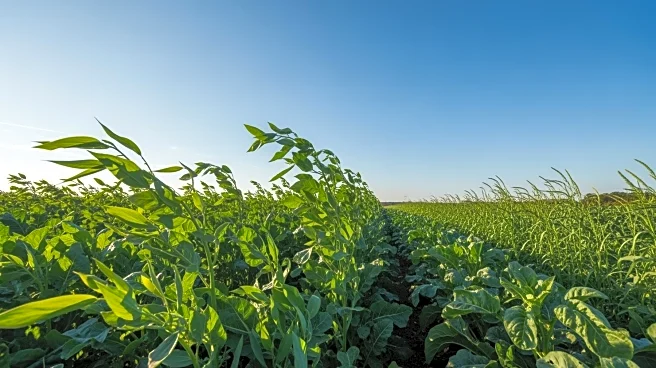What's Happening?
Nestlé has launched a significant initiative aimed at combating climate change through regenerative agriculture in Nigeria. The program, known as the Strengthening Farmers’ and SMEs’ Resilience through Climate Smart Grain Production (StreFaS), targets
25,000 smallholder farmers across Kaduna and Nasarawa States. This initiative is part of a broader strategy to secure Nestlé's supply chain by improving the environmental and economic conditions of the farmers who supply grains like maize, soybean, and sorghum. The program involves training farmers in practices that restore soil health, reduce greenhouse gas emissions, and increase biodiversity. Nestlé is also addressing packaging waste by upgrading its cereal packaging to be 95% recyclable, aligning with its global commitment to minimize waste.
Why It's Important?
The initiative is crucial as it addresses the existential risk climate change poses to both Nigeria's economy and Nestlé's supply chain. By investing in regenerative agriculture, Nestlé aims to ensure a sustainable supply of high-quality ingredients, which is vital for its iconic brands. This approach not only benefits the farmers with increased yields but also contributes to environmental conservation through carbon sequestration. The program exemplifies a shift from traditional corporate philanthropy to a model of shared value, where both the company and the farmers benefit. Additionally, Nestlé's efforts in improving packaging recyclability and reducing waste are significant steps towards mitigating the environmental impact of plastic waste in Nigeria.
What's Next?
Nestlé plans to continue its efforts in regenerative agriculture with the goal of sourcing at least 50% of key ingredients from such practices by 2030. The company is also working towards achieving 100% renewable electricity in its global operations by 2025. In Nigeria, Nestlé has already implemented water-saving technologies and rainwater harvesting systems in its factories. These initiatives are part of a larger strategy to achieve 'triple-zero' status in terms of water, waste, and carbon emissions. The success of these programs could serve as a model for other companies operating in climate-sensitive regions.
Beyond the Headlines
Nestlé's initiative highlights the ethical and practical dimensions of corporate responsibility in the face of climate change. By integrating environmental sustainability into its core business strategy, Nestlé is setting a precedent for how companies can contribute to global climate goals while ensuring their own survival. This approach may influence other corporations to adopt similar strategies, potentially leading to broader shifts in industry practices towards sustainability.















